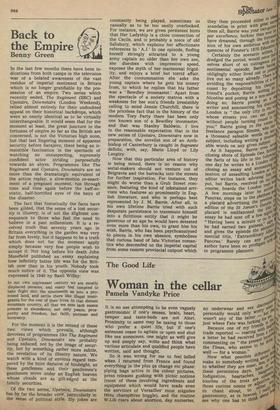Back to the Empire
Benny Green
In the last few months there have been indications from both camps in the television war of a belated awareness of the vast residue of imperial sentiment in Britain which is no longer gratifiable by the possession of an empire. Two series which recently ended, The Regiment (BBC) and Upstairs, Downstairs (London Weekend), relied almost entirely for their undoubted appeal on their historical backdrops, which were so nearly identical as to be virtually interchangeable. It would seem that for the moment at least, the great juncture in the fortunes of empire so far as the British are concerned, is not the Victorian high noon, but that last lingering moment of apparent security before Sarajevo, there being an irresistible fascination in the spectacle of watching an unsuspecting, supremely confident actor striding purposefully towards an abyss. Programmes like The Regiment and Upstairs, Downstairs are no more than the dramaturgic equivalent of the action replay, a slow-motion re-enactment of a pregnant moment, run through time and time again before the half-ecstatic, half-horrified eyes of the heirs of the disaster.
The fact that historically the facts have been gilded, that the sense of a lost security is illusory, is of not the slightest consequence to those who feel the need to believe in a past millennium. It is a received truth that seventy years ago in Britain everything in the garden was very far from lovely, but it happens to be a truth which does not for the moment apply simply because very few people wish to accept it. Not long before his death John Masefield published an essay explaining how infinitely better life was for the British now than in his youth. Nobody took much notice of it. The opposite view was expressed in 1949 by Basil Willey: In our own unpleasant century we are mostly displaced persons, and many feel tempted to take flight into the nineteenth as into a promised land, and settle there like illegal immigrants for the rest of their lives. In that distant mountain country, all that we now lack seems present in abundance; not only peace, prosperity and freedom, but faith, purpose and buoyancy.
For the moment it is the second of these two views which prevails, although devotees of programmes like The Regiment and Upstairs, Downstairs are probably being seduced, not by the image of security, but by something rather more subtle, the revelation of its illusory nature. We watch with a kind of envious regard tempered by the faint derision of hindsight, as these gentlemen and their gentlemen's gentlemen move under an English heaven whose clouds are as gilt-edged as the family securities.
Of the two series, Upstairs, Downstairs has by far the, Is
..rnA; ..rnA;
xr.s PW particularly;ft the sense of political style. Sly jokes are constantly being played, sometimes so casually as to be too easily overlooked.
For instance, we are given persistent hints that Her Ladyship is a close connection of the Cecils, and is probably a niece of old Salisbury, which explains her affectionate references to ' A.J.' In one episode, finding herself strongly attracted to a young army captain no older than her own son, she disrobes with impressive speed, exposes the myth of her marmoreal frigidity, and enjoys a brief but torrid affair. After the consummation she asks the young captain where he gets his money from, to which he replies that his father was a ' Bewdley ironmaster.' Apart from the spectacle of a society matron with a weakness for her son's friends irresistibly calling to mind Jennie Churchill, there is the priceless fact that in the history of the modern Tory Party there has been only one known son of a Bewdley ironmaster, and that was Stanley Baldwin. I live in the reasonable expectation that in the new series of Upstairs, Downstairs now in preparation, the novelist son of an Archbishop of Canterbury is caught in flagrante delicto, with, say, Marie Lloyd or Lily Langtry.
Now that this particular area of history is being mined, there is no reason why serial-makers should not venture out of Belgravia and the barracks into the streets for further inspiration. For instance, they might do worse than a Grub Street romance, featuring the kind of inkstained arri viste who features so prominently in English literature, and who is perhaps best represented by J. M. Barrie. After all, in his own lifetime Barrie tried with such desperate persistence to transmute himself into a fictitious entity that it might be generous of an age he would have detested even more than his own, to grant him his wish. Barrie, who has been psychoanalysed to pieces in his own absence, symbolises that curious band of late Victorian roman tics who descended on the imperial capital from some remote provincial outpost which










































 Previous page
Previous page